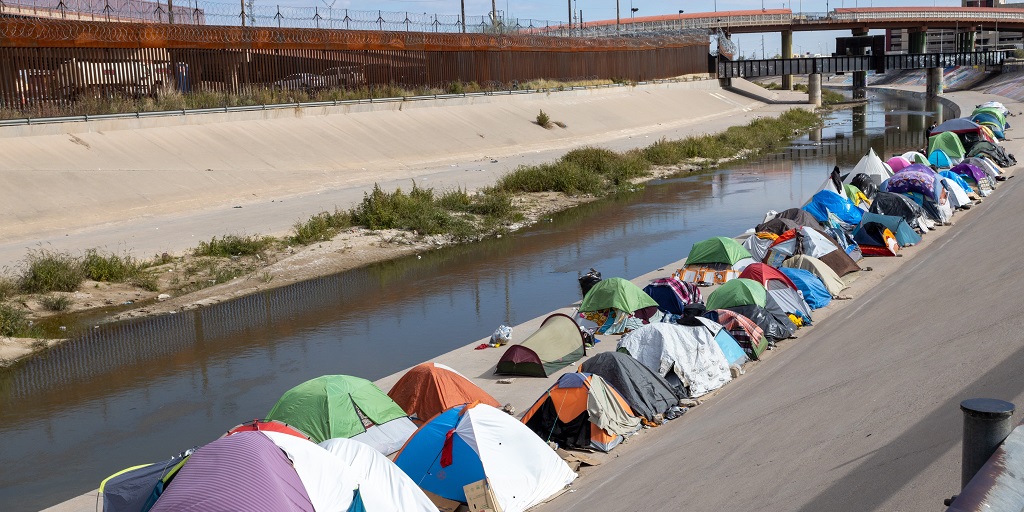Last week, a federal court in California issued a decision allowing asylum seekers and other plaintiffs to continue their legal challenge to the Trump-era “Remain in Mexico” program, officially (and in true Orwellian fashion) called the Migrant Protection Protocols (MPP). The program—which forced migrants to wait indefinitely in Mexico for their immigration court asylum hearings in the Unites States—has dropped out of the spotlight but continues to have important consequences for asylum seekers and future presidential administrations.
Plaintiffs in the lawsuit, Immigrant Defenders Law Center v. Mayorkas, ask the court to declare that the implementation of MPP was unlawful and to give migrants forced to enroll in it the opportunity to enter the United States to access the asylum system.
In a lengthy decision, Judge Bernal of the Central District of California denied the Biden administration’s attempts to dismiss the litigation. He pointedly rejected the majority of the government’s arguments, noting that its position “that even if they did engage in a cruel, unprecedented scheme to deprive nearly 70,000 asylum seekers of their rights, there is nothing this Court could do about it” was “contrary to centuries of precedent.”
The court also granted class certification. This will provide a clearer path forward for tens of thousands of migrants that plaintiffs allege were wrongfully subject to MPP and remain outside of the country, often in dire circumstances.
Hasn’t the Remain in Mexico policy been terminated?
Last August, President Biden announced–for the second time—the end of Remain in Mexico. The termination came on the heels of the Supreme Court’s ruling in June 2022 that the Biden administration had properly sought to end the program the previous year.
The program has still been in flux, however, after Judge Kacsmaryk of the Northern District of Texas issued a new decision in December 2022 that placed the agency memo that terminated the program on hold. As the government’s appeal of this lawsuit winds through the courts, the Mexican government has made clear that it opposes any effort by the U.S. to restart Remain in Mexico.
If MPP is over, what’s the problem?
Under the Trump administration, approximately 70,000 people were subjected to MPP between January 2019 and February 2021, when President Biden first ended the policy. As Judge Bernal explained in his March order, MPP “trapped [] asylum seekers in Mexico in dangerous conditions that impeded their ability to access the U.S. asylum system or obtain legal representation.”
MPP forced migrants to wait in some of the most violent cities in the world for their asylum hearings in border immigration courts (many of them in hastily erected tents). Doing so had a clear impact on the outcomes of their removal cases: during the initial implementation of Remain in Mexico, less than one percent of asylum seekers in MPP had obtained any relief in immigration court.
During both wind-downs of MPP, DHS allowed some individuals who had been enrolled in the program to enter the U.S. to pursue their asylum cases. However, the logistical and procedural barriers to doing so—some specifically created by the Biden administration as pre-requisites to reentry, and others caused by the horrific conditions migrants endured after returning to Mexico through MPP—meant that thousands of asylum seekers subjected to the policy remain stranded in Mexico.
The recent court order found the case can continue because the plaintiffs previously subjected to MPP are still suffering because of the government’s actions. The court also ruled against the government on its myriad other jurisdictional arguments. Judge Bernal ruled that the majority of the plaintiffs’ claims could go forward. Specifically, the claims address the right to apply for asylum and access to counsel under the Administrative Procedures Act; access to a full and fair hearing under the Due Process Clause; and to petition the courts, consult with counsel, and advise clients under the First Amendment.
What’s next for MPP?
The human consequences of MPP for the asylum seekers subjected to the program between 2019 and 2022 are appalling, particularly the outsize harms inflicted on children, Black, indigenous, and LGBTQI migrants. Even more problematic is the fact that the administration has continued to “vigorously defend” the legality of MPP and its statutory authority to implement a similar program in the future.
The right to seek asylum cannot depend on shifting policy preferences of the executive branch. Judge Bernal’s order allowing the legal challenge to MPP to move forward is a necessary and welcome development.
FILED UNDER: Migrant Protection Protocols, U.S.-Mexico Border


